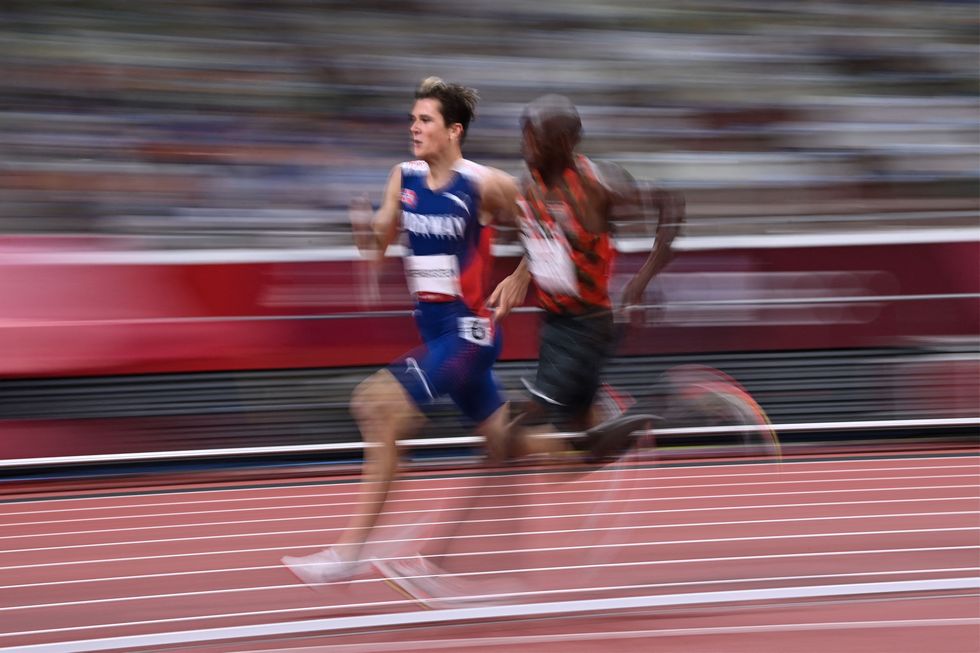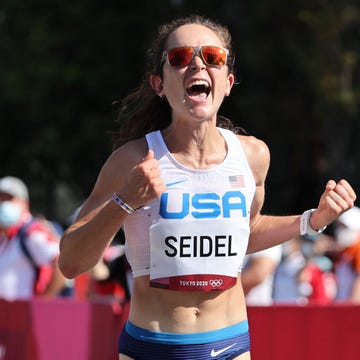Sprinting past front-running Timothy Cheruiyot off the final turn, 20-year-old Jakob Ingebrigtsen of Norway won the men’s 1500-meter final in 3:28.32 on August 7 in Tokyo. His time broke the Olympic record of 3:31.65, set just two days ago by Kenyan Abel Kipsang in the semifinals.
Cheruiyot, the 2019 world champion, held on for second in 3:29.01, just ahead of Josh Kerr of Great Britain, the bronze medalist in 3:29.05. Cole Hocker, the NCAA and U.S. Trials champion, finished sixth in a personal best of 3:31.40. He was the sole American in the final.
Ingebrigtsen and Cheruiyot are no strangers on the track. This was the 13th time the two have clashed, but it was the first time the Norwegian beat his Kenyan counterpart.
“I’ve been struggling with eating for the last couple of weeks because I have been waiting so long for this race,” Ingebrigtsen said. “This is what you want as a professional runner. I’ve been able to do it [win gold] first try, and I feel like I am just getting started. But at the same time, I have been dreaming of this for my whole life. It’s great.”
Cheruiyot, the fastest in the world this year, had said before the race he expected a sub-3:30 winning time. He made that prediction come true by taking the lead at the end of the first lap and forcing the pace in the same way that he did to win the world title two years ago. But this time, Ingebrigtsen was able to stay in contact through the final turn, and then use his superior closing speed to outrun the Kenyan.
→ Join Runner’s World+ to stay up to date on the Tokyo Olympics!
The fast pace was a sharp contrast to the 2016 Olympic final, a sit-and-kick affair won by American Matthew Centrowitz in 3:50.00, the slowest winning time since the 1932 Olympics. (Centrowitz finished ninth in his semifinal in Tokyo and didn’t advance to today’s final.)
“Jakob is a good racer, he is a young athlete, he is coming fast, so I’m happy about the race,” Cheruiyot said. “He’s a good racer, and I want to say to him congratulations.”
Today’s gold is Ingebrigtsen’s first medal on the world stage. He placed 4th and 5th in the 1500 and the 5,000 meters at the 2019 World Championships, respectively, but his status has been growing leading up to these Olympics.
He’s the youngest of the famed running brothers from Norway. His father, Gjert, coaches Ingebrigtsen and his older brothers, Filip and Henrik, who have both established their own impressive track careers. Filip earned a bronze medal in the 1500 meters at the 2017 IAAF World Championships, and Henrik was the 2012 European champion in the 1500 meters.
This past June at a Diamond League meet in Florence, Italy, Jakob ran a European record time of 12:48.45 in the 5,000 meters, but he focused solely on competing in the 1500 for the Olympics.
“This is not me winning this race. If it wasn’t for my brothers, my family and my fiancee, I wouldn’t be able to do any of this,” Ingebrigtsen said. “It’s not just me; it is a whole team around me that’s incredible.”
Bothered by a hamstring strain, Cheruiyot finished fourth in the 1500 in the Kenyan Olympic Trials in June and was initially left off the team. He was named to the Kenyan squad in July after running a world-leading time and personal best of 3:28.28 at the Monaco Diamond League. The second-place finisher at the Kenyan Trials, Kamar Etyang, was removed from the Kenyan team because the relatively unknown 18-year-old hadn’t undergone the requisite number of out-of-competition drug tests.
The quick final provided several personal bests throughout the field. Along with Kerr and Hocker, Kipsang ran another PR of 3:29.56, Adel Mechaal of Spain took fifth in 3:30.77, and Michal Rozmys of Poland was eighth with a best of 3:32.67. The top seven finishers ran better than the Olympic record before these Tokyo Games started (3:32.07).
—This story will be updated.

Scott is a veteran running, fitness, and health journalist who has held senior editorial positions at Runner’s World and Running Times. Much of his writing translates sport science research and elite best practices into practical guidance for everyday athletes. He is the author or coauthor of several running books, including Who Is Jakob Ingebrigtsen, Advanced Marathoning, and The Fastest Shoes of the Women’s Olympic Marathon. Jakob Ingebrigtsen Wins Men’s 1500 Meters in an Olympic Record Slate, The Atlantic, the Washington Post, and other members of the sedentary media. His lifetime running odometer is past 110,000 miles, but he’s as much in love as ever.













